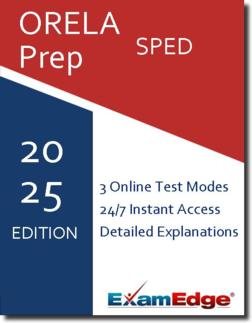ORELA Special Education (601) Practice Tests & Test Prep by Exam Edge - Topics
Based on 17 Reviews
- Real Exam Simulation: Timed questions and matching content build comfort for your ORELA SPED test day.
- Instant, 24/7 Access: Web-based ORELA Special Education practice exams with no software needed.
- Clear Explanations: Step-by-step answers and explanations for your ORELA exam to strengthen understanding.
- Boosted Confidence: Reduces anxiety and improves test-taking skills to ace your ORELA Special Education (601).

Understanding the exact breakdown of the ORELA Special Education test will help you know what to expect and how to most effectively prepare. The ORELA Special Education has multiple-choice questions The exam will be broken down into the sections below:
| ORELA Special Education Exam Blueprint | ||
|---|---|---|
| Domain Name | % | Number of Questions |
| Students with Disabilities | 20% | 30 |
| Assessment and Program Planning | 20% | 30 |
| Learning Environments and Instructional Practices | 40% | 60 |
| Foundations and Professional Practice | 20% | 30 |


